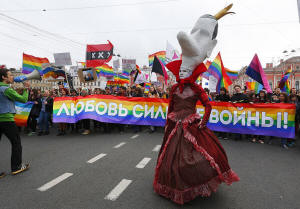Russia's LGBTQ+ community is living in fear following new laws and court
rulings, activists say
 Send a link to a friend
Send a link to a friend
 [December 06, 2024]
By DASHA LITVINOVA [December 06, 2024]
By DASHA LITVINOVA
TALLINN, Estonia (AP) — Gela Gogishvili and Haoyang Xu led a happy life
as a gay couple in Russia, even as President Vladimir Putin’s government
took an increasingly anti-LGBTQ+ stance.
Their social media posts and videos drew thousands of followers, and
they were greeted by them sometimes on the streets in Kazan, in Russia's
Tatarstan region, where Gogishvili was a pharmacist and Xu, from China,
studied international relations at a university.
But the online threats began after the Kremlin in December 2022 expanded
its ban of “propaganda of nontraditional sexual relations” from minors
to adults, effectively outlawing any public endorsement of LGBTQ+
activities. Then came the complaints about them to authorities.
They were detained in 2023 and accused of spreading “LGBT propaganda”
among minors. Gogishvili was given a hefty fine, while Xu was put in a
detention center for migrants to await deportation.
They eventually fled abroad separately. Now reunited in France, where
they’re seeking asylum, they look with concern at Russia, where new,
even harsher anti-LGBTQ+ measures have been adopted.
Just over a year ago, Russia’s Supreme Court effectively outlawed any
LGBTQ+ activism in a ruling that designated “the international LGBT
movement” as extremist. The move exposed anyone in the community or
connected to it to criminal prosecution and prison, ushering in an
atmosphere of fear and intimidation.
“I’m scared for the queer community in Russia that remains in the
country,” Gogishvili told The Associated Press.
Linking LGBTQ+ rights to the war in Ukraine
That community in Russia has been under legal and public pressure for
over a decade but especially since the Kremlin sent troops to Ukraine in
2022. Putin has argued that the war is a proxy battle with the West,
which he says aims to destroy Russia and its “traditional family values”
by pushing for LGBTQ+ rights.

Putin insists Russia isn't discriminating against LGBTQ+ people, but he
also decries “perversions that lead to degradation and extinction.”
Parliament Speaker Vyacheslav Volodin last year called gender
transitioning “pure satanism” and “diabolical policy” that should stay
in the U.S.
Any public representation of gay and transgender people is banned.
Gender-affirming medical care and changing one’s gender in official
documents are prohibited. With the Supreme Court's ruling in November
2023, anyone involved with the LGBTQ+ community could be imprisoned for
up to six years.
As a result, many left the country. But others remain -– and find
themselves in a community pushed into the shadows, marginalized even
further and dogged by fear of repression.
“Six years, it's not a joke,” Olga Baranova, head of the Moscow
Community Center for LGBT+ Initiatives, said in an interview from
outside Russia. “'What is worth me going to prison for six years?' Every
person who's doing something right now (in LGBTQ+ activism in Russia)
has to answer this question these days.”
Targeting nightclubs, rainbow flags and gay tourism
Just days after the Supreme Court ruling, the LGBTQ+ community was
rattled by news of police raiding gay bars, nightclubs and venues that
hosted drag shows in Moscow, St. Petersburg and other cities.
Last spring, the first criminal case on charges of involvement with the
"LGBT movement” extremist group was lodged against the owner and the
staff of a bar in the southwestern city of Orenburg that held drag
performances. A handful of similar cases came elsewhere.
Charges have been launched for displaying symbols such as a rainbow flag
— even though many of those accused had nothing to do with the LGBTQ+
community, said human rights lawyer Max Olenichev.
More raids of bars and nightclubs were reported in Moscow last month,
almost exactly a year since the Supreme Court ruling. State media quoted
law enforcement as saying they targeted those spreading “LGBT
propaganda.”
One man arrested for allegedly running a travel agency for gay customers
faces charges of organizing activities of an extremist organization.
Independent news outlet Mediazona reported that Andrei Kotov rejected
the charges and said in court that law enforcement officers beat him and
administered electric shocks during the arrest, even though he didn’t
resist.
On Nov. 23, Putin signed into law a bill banning the adoption of Russian
children by citizens of countries where gender-affirming care is legal.
He also approved legislation outlawing the spread of material that
encourages people not to have children.
“All this, in general, speaks more about the desire of the authorities
to create some kind of atmosphere of fear. It's not repressions, it's
terror," said Vladimir, an LGBTQ+ rights advocate in Russia who like
many interviewed by AP asked to be identified only by a first name out
of security concerns.
Ikar, a fellow activist and transgender man, described the actions by
authorities as "an attempt to intimidate ... to make people lose their
social connections, stay silent, stay home.”
[to top of second column]
|

A gay rights activist wearing a mask walks ahead of gay rights
activists during a May Day rally in St. Petersburg, Russia, on May
1, 2014. (AP Photo, File)

Going underground, online or abroad
Vladimir and Ikar belong to an underground LGBTQ+ rights group that
offers legal aid and holds offline events without fanfare. Activists
thoroughly verify identities of anyone seeking its help.
The group is seeing a growing number of cases related to violence
against LGBTQ+ people, Vladimir said.
Some regional organizations have shut down completely; others
operate openly, but in a drastically different way. The Moscow
Community Center for LGBT+ Initiatives moved its community-building
efforts into a sprawling online network of chats and Zoom meeting
rooms, according to Baranova.
“Our strategy today is to preserve the community in some form and
size at least, for the people to just know each other, support each
other,” she said.
Center T, a prominent trans rights group, closed its Moscow shelter
after visits from police and opened one in Yerevan, Armenia, said
group leader Yan Dvorkin. Center T helps emigres as well as those
still in Russia to find doctors and medical care, trying to resolve
crises and still be a part of a community, if only online.
Anna, a 25-year-old transgender woman in Moscow, said being part of
the community provided the courage to transition. “I can’t imagine
what it’s like for new people, who are only opening up the
possibility for themselves,” she said.
Anna transitioned and came out to her family and friends last year,
after the ban on gender-affirming care was enacted.
The ban and other repressive laws and rulings hit the
already-vulnerable transgender community hard, Dvorkin said.
Finding a job has become more difficult, both for those who haven’t
changed their gender marker in documents and those who have, he
said. Access to gender-affirming medical care is a major issue, with
doctors wary of working with transgender people and with many
turning to shoddy underground medications.
Violence against transgender people has spiked, as has harassment
and discrimination, Dvorkin said.
“Nowadays, you can intimidate people — blackmail them — by (saying)
that ‘I will report you and you will go to prison for extremism,’”
the activist said.
Those who stay in Russia, despite the risks
Anna considers herself lucky and “privileged.” She has a well-paying
job, can afford a doctor advising her from abroad on hormonal
therapy, and can get the medicine in Moscow. She wouldn't elaborate
on how and where she gets it, so authorities “don’t pull the plug.”
But she said she hasn’t come out to her colleagues for fear of
losing her job, and she is sometimes harassed on the street because
of her appearance. Her identity documents can't be changed under the
ban.
She says she has a support network of friends and doesn’t want to
leave Russia, even though she’s acutely aware of the risks.
“I somehow have managed to adapt,” she said. “I know how to live
here.”
Yulia, another transgender woman, also vowed to stay, describing it
as sort of a mission to show that “people like me are not
necessarily weak, are not necessarily useless.”
In her mid-40s, Yulia has a family and children, a successful career
in a male-dominated industry, and the respect and acceptance from
her colleagues and friends. For her, “it’s about normalizing” being
trans, she said.

How much “normalizing” is possible in the current climate and the
years ahead is still an open question.
The ban on “propaganda of nontraditional sexual relations” forces
print, TV and movie censorship of LGBTQ+ relations. In a recent
example, two Russian streaming services cut a transgender character
from the 1990 drama series “Twin Peaks.”
At the same time, there is abundant official rhetoric from
politicians, the Russian Orthodox clergy and media figures
condemning LGBTQ+ people.
Many like Gela Gogishvili, the gay man who fled Russia last year,
worry about the next generation of LGBTQ+ people.
He said he's “even more scared for those who are born there and are
currently growing up -– from their childhood years onwards, they
will be taught that (being queer) is bad.”
“Like it was with me,” Gogishvili adds. “I couldn’t accept myself
until I was 20 years old.”
All contents © copyright 2024 Associated Press. All rights reserved |